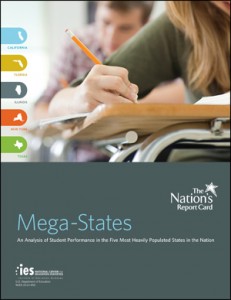Florida business leaders put a spotlight Wednesday on the promise and potential pitfalls of Common Core - the tough, new academic standards that are rolling into Florida schools and will help re-shape teaching, learning and testing.
At a wide-ranging, day-long education summit in Orlando, several participants suggested a public awareness campaign to inform parents about the changes – which may be initially painful when they're implemented in the 2014-15 school year - and to rally broad support in a way that has eluded many of the state’s other, recent education reforms.
“These tend to be Tallahassee conversations. But if we don’t do this right, it becomes a Miami conversation or a Jacksonville conversation” and not in a positive way, Marshall Criser III, president of AT&T Florida and chairman of the Florida Council of 100, told redefinED during a break. “We have an opportunity and responsibility to take this back to our communities ... Because if not us, then who?”
“The state should own this initiative,” Education Commissioner Tony Bennett told attendees, reminding them of the marketing effort a decade ago for Just Read, Florida. “It shouldn’t be teachers against people. It shouldn’t be the state against schools, state against districts. This should be a statewide rollout that says this is important to our children and this is important to the future of our state.”
The Council of 100 sponsored the summit with the Florida Chamber Foundation, the National Chamber Foundation and the Institute for a Competitive Workforce. About 100 people attended, including three lawmakers, two superintendents, Board of Education Chairman Gary Chartrand and Florida Education Association President Andy Ford.
Spurred by the National Governors Association and the Council of Chief State School Officers, the Common Core standards in math and language arts have been adopted by 44 states. They’re well-thought-out and well-vetted. They’re benchmarked against international standards. They’re designed to instill a deeper knowledge than state standards do now. In the long term, supporters say, the higher bar will better prepare students for college and careers and an ever-more-competitive world. In the short term, though, ouch: They’re expected to result in a steep drop in test scores – and all the angst that comes with it.
“That’s a pain point,” Criser said. “But people have to understand that’s good,” he continued, because it’s the first step on a better path.
The discussion around Common Core has centered almost exclusively on public schools. But its gravitational pull is expected to be so strong that the impact will be felt at the private schools, too, to varying degrees. (more…)
Teach for America. It's looking at Tampa Bay for expansion. Gradebook.
 Charter schools. The Orange school board renews four charters and accepts the voluntary closure of another, reports SchoolZone. A charter school's plans to move in Miami-Dade don't make its parents or potential new neighbors happy, reports the Miami Herald. A judge rules the principal of an Imagine charter in Sarasota - seeking a split with its parent company - won't be banned from campus, reports the Sarasota Herald Tribune.
Charter schools. The Orange school board renews four charters and accepts the voluntary closure of another, reports SchoolZone. A charter school's plans to move in Miami-Dade don't make its parents or potential new neighbors happy, reports the Miami Herald. A judge rules the principal of an Imagine charter in Sarasota - seeking a split with its parent company - won't be banned from campus, reports the Sarasota Herald Tribune.
FCAT season. Underway, notes SchoolZone. But some schools in some districts put off the writing test because of bad weather, reports Gradebook. Some worry that tougher writing standards could result in lower school grades, reports the Naples Daily News.
Literacy. A third-grade retention policy like Florida's would help students in New Mexico. EdFly Blog.
Settlement. The U.S. Justice Department settles with the Palm Beach school district in a case involving complaints of discrimination against immigrant children in enrollment and discipline cases, reports the South Florida Sun Sentinel. More from the Palm Beach Post.
Sequestration. Would hurt low-income and special needs children the most, Palm Beach district officials tell the Palm Beach Post. More from the Florida Times Union. (more…)
 For the second time this week, a credible, independent analysis shows Florida students leading the pack in progress.
For the second time this week, a credible, independent analysis shows Florida students leading the pack in progress.
Between 1992 and 2011, Florida students made bigger gains than students in four other “mega states” in fourth- and eighth-grade reading and fourth-grade math, according to a report released Thursday by an arm of the U.S. Department of Education. In each case, they moved from below the national average to meeting or exceeding it. Low-income and minority students in particular showed traction.
“There is something real going on there,” said Jack Buckley, commissioner of the National Center for Education Statistics, according to Education Week.
The center’s comparison followed Wednesday’s College Board report that showed Florida continues to climb the charts on Advanced Placement exams. The Sunshine State now ranks fourth in the percentage of high school graduates passing AP exams. Over the past decade, it ranks second in progress.
Broken-record alert No. 1: Florida’s trend lines shouldn’t be a surprise, given reports like this, this, this, this and this in the past year alone. Yet there remains a lingering perception, cultivated by critics, that Florida’s public schools are sub par and stagnant.
For Thursday’s report, the center for the first time compared scores from Florida, California, Texas, New York and Illinois – the states with the biggest student populations and arguably the biggest challenges. It used results from the National Assessment of Educational Progress, a battery of tests better known as “The Nation’s Report Card” and considered the gold standard among standardized assessments.
In eighth-grade math, Florida students made gains but remain below the national average. Elsewhere in the report, they were singled out often. (more…)